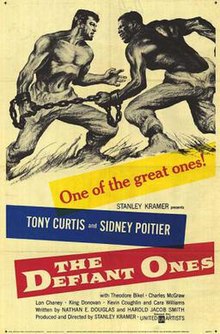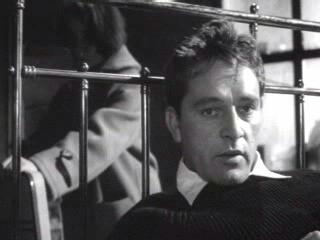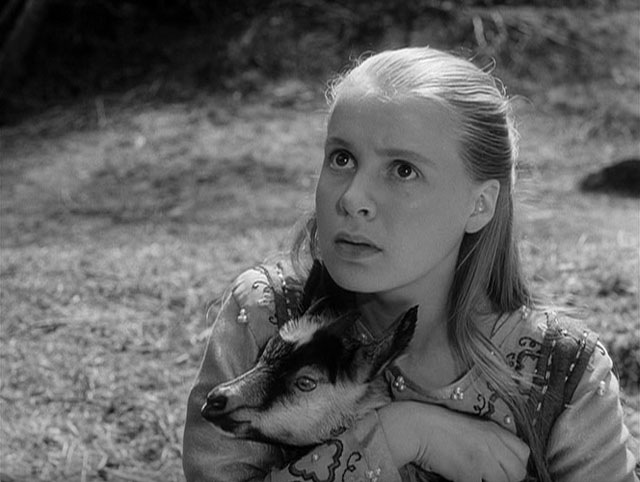Back in 1985, we still thought it was our birthright to have a girlfriend who was not only physically perfect, but extraordinarily friendly and kind as well (The Karate Kid, which I believe came out in the same year, also mined this vein, as did doubtless numerous other examples which I cannot at the moment recall). So this video did not strike a great part of the viewing public as ridiculous or a cruel lie as one might expect, but as the way teenage life properly ought to turn out if you were not incredibly unlucky. I was fifteen in '85. I recall it as a pretty positive time. I was in the end of my freshman year and beginning of my sophomore year in high school, and it was one of the three or four brief windows of time I have had in my life where I can actually say some development occurred. That was the year I first started to read a lot of old literature, or at least 19th century novels, and at the time it seemed to have a significant effect on my mind, enough that the idea that if I were a kid today I would probably be too immersed in trying to make friends on the internet to bother with reading those books disturbs me a little. I also gained about 20 pounds, which only brought me from 145 to around 165, so it's still not like I was terrorizing people at the beach, but things seemed to heading in the right direction (after this unfortunately I didn't gain any more weight at all until about the mid-90s). I also even improved enough in basketball that the other guys on the team allowed me (tentatively) to give them an occasional nod acknowledging social connection when I would pass them, often while they were engaged in talking up some chicks, in the hallway or cafeteria. Unfortunately all this progression came to a sudden halt around the middle of my sophomore year, and improved very little, and correspondingly got very little out of, my remaining years in high school. Even my reading tailed off considerably, and the initial intensity and rush of fulfillment that I had felt during the fall and winter of '85 burned themselves out, though they would at least reappear in a couple of periods of similar duration, one during college up to about the middle of my junior year, at which point I was evidently sated for the time being and ceased to progress any further in that environment, and then one last for about 18 months in '96 and '97 during most of which time I was in Prague. Since then, however, I have not had any similar burst of consciousness of any expansion of my mental powers. I have kind of resigned myself to the idea that it probably will not happen again.
There are legions of people in the world who are adamant that the Rolling Stones are the greatest rock group in the history of the world, and will not truck any discussion to the contrary. I am not one of these advocates, as I only really like about seven or eight of their songs, all of which are among the famous ones (I don't think I can even name a Rolling Stones song that was not a massive hit). I also see, through this video research, that almost all of their best songs were released in the 2 or 3 year period at the very beginning of their careers, off of which brief space of time the group and its individual members have been living large for close to a half-century now. I don't begrudge them this, because they are very cool and these early songs really are amazing to think of in their moment, but I am surprised, and frequently am surprised in the case of artists, by how brief the window was in which their particular genius flourished. The much lamented Brian Jones, who has now been dead so long I don't think he can be referred to as "late" anymore, really hasn't missed a whole lot (apart from what he himself might have contributed), as far as major artistic achievements are concerned, by dying in 1967.
Another great song and video from farther back than I had realized. The atmosphere in this is so intense. The way the girls were just put into a trance back in the day by these rock groups is just incredible. I really think the display of these things on TV contributed to throwing the entire society out of whack. The average (beta or below) man, it suffices to say, in the days before television would have easily passed all the days of his life without having the slightest idea what women under the influence of intense hormonal excitement looked like, unless they happened to walk in on one in the act of being seduced by the great alpha male of both of their circumscribed world, though even in that case it would not have behooved Beta Man to study the scenario more closely given the physical proximity of a superior man. Once the young men of the television age began seeing footage of their female years swooning and having apparently lost all ability to control their presentation, naturally producing a proximate reaction in some such lady or group of ladies through their own exertions overwhelmed all other considerations, especially of a courteous and honorable nature.
All this acknowledged, it has been my experience that the most hardcore Rolling Stones fans have been overwhelmingly male, along with a few females of the type who were generally left unsupervised by any parental figure in high school and took full advantage of that freedom to make themselves the kind of girls that even bad boys hesitate to introduce to mother.
With regard to the comment threads on these videos, which reveal a lot of things that I find interesting, the commenters on the Stones videos are around 80-90% male, and heavily focused on how forkin' cool they are (which is absolutely true, if you're a generic white male, nothing looks cooler than Mick Jagger, Brian Jones, et al 1965-66) while Beatles videos, especially the early ones, even in 2012 are dominated by girls talking about how cute they are. "Nice" girls especially really do seem to uniformly prefer the Beatles, however awesomely cool the Stones are, and I think they are still the majority, albeit a shrinking one, of the women out there, especially in the serious dating and marriage market.
I don't think I had ever seen this. It's beautiful. Probably the most unabashedly and self-consciously 'English' video they ever made, and because it is them, it works perfectly.
I'm not sure why I am fascinated with this one. I'm in a mini phase where I'm suddenly interested in what was going on around '78-'82 in this particular niche of music, because there were a lot of very good, original, and natural sounding songs emanating from this wave, especially in England, but there some from America too, such as, I believe, the one below. By natural sounding I mean they don't sound forced or overly labored over, but as if they arose out of some urgent circumstance of life at the time which carried, or at least suggested, its own form with it already. The Elvis video I guess just reminds me of what a different world it was in the late 70s, especially in England. Old English music shows like Top of the Pops always give me the impression of being like a community television production, where these guys who are famous all over the world are somehow playing at the corner pub in front of a bunch of people who knew them at grammar school and cannot be in awe of them because they know the drummer's grandfather was a cabbie. It just isn't the same vibe I get from similar programs in this country.
This is a truly excellent song. This guy is from Detroit, though the song is very much in the British pop style, and as such has, for me at least, something of that intimate, non-bombastic feel that I like, but with rock music, especially after 1960 or so, mostly identify with British acts. I don't know why that style of music or songwriting is not more common in America (nowadays). I do often think that the consciousness of the "global" market or audience--maybe even the national one--has something to do with it. Hank Williams and Louis Armstrong, if they are not global icons (though they may be), are certainly famous nationally, but I suspect most of their good stuff was written with a very narrow demographic in mind. The same could be said for almost all of the 'Great Books", Shakespeare and certainly the Greeks, included. I really don't think most of our canonical authors were anticipating the day when Leo Strauss and his school would emerge to properly interpret their work. They wrote their works for the flesh and blood people they knew. Obviously in most instances--music perhaps especially--you do have to have a good audience that is going to be receptive to something that is interesting and new. But people who have not achieved a high degree of intimacy with the predilections of their prospective audience, whomever they anticipate that as being, are going to struggle to produce anything that is pleasing to anyone












